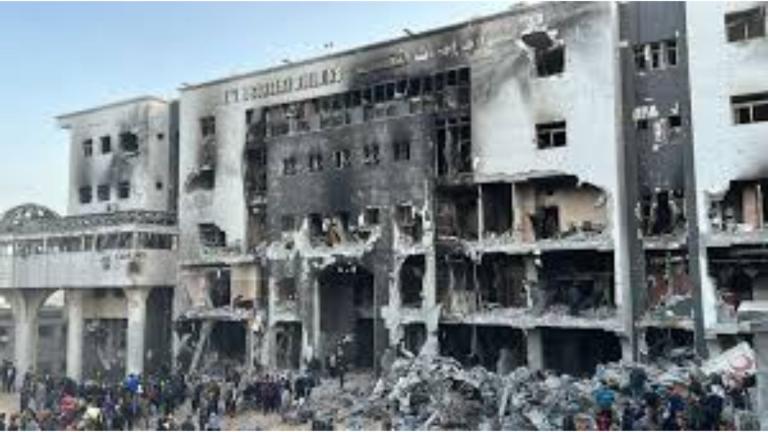
The title might be confusing but it makes sense. What happens when injustice is viewed in such a way that it isn’t considered an injustice? And what are we to do when what is deemed “justice” is actually “injustice”?
I dare say, “Houston, we have a problem.”
As the church, we are called to cry out against injustice. We are to weep with those who suffer injustices. We are to condemn those who commit injustice. And we are to demand justice; especially for the sake of the oppressed.
Yet, when it comes to the actions of Israel we get a little uneasy. (Even this last sentence is sure to ruffle some feathers).
When the conversation turns to Israel and its assault on Gaza, some unwritten (though they are practically written on stone) rules are invoked before the conversation is allowed to proceed.
First, there must be an unequivocal condemnation of Hamas. Check.
This includes their attack on Oct 7 and their stated goal of annihilating Israel. Check.
Second, there must be a complete acknowledgment of Israel’s existential fear of annihilation. Check
Third, there must be a condemnation of antisemitism. Check.
Once these boxes are all checked, the conversation may continue.
In saying this, I want to acknowledge that I understand the rules and have no problem with them. I recognize that Israel has an existential fear, that the history of antisemitism in the church is something we should acknowledge and repent of, that antisemitism is tragically alive and well in the world today, and that Hamas’ militant wing is evil.
My concern is that when Christians love Israel so deeply that they are unwilling, or unable, to criticize the nation. When this happens, their love for Israel has become idolatrous. Not only has it become idolatrous, it is no longer love. After all, the present war on Gaza is not good for Israel.
NB: Believing that cutting off food, water, and electricity to 2.3 million people is necessary because it is the only way to disarm Hamas fighters; accounting for the 17,000 kids who have become orphans as the unfortunate result of war; justifying the total destruction of Gaza’s largest hospital (al Shifa) not to mention the other 24 of the 36 hospitals in Gaza, is warranted because Hamas fighters were present making them legitimate military targets; claiming that the displacement of 1.9 million people is humane because Israel sent millions of leaflets warning them to leave; saying that the attack on the three vehicles in the World’s kitchen was a mistake; not permitting aid trucks to enter; all of this is immoral, unethical, and equally damnable.
Christianity Today’s Podcast The Promised Land
In my last post, I noted that I have had great respect for the work of Christianity Today and, in particular, the podcast series that Mike Cosper put out almost 2 years ago titled, “The Rise and Fall of Mars Hill.” So, I was intrigued by the fact that Cosper was doing a new series on Israel and Palestine.
As I noted in my last post, “Sorry, Christianity Today, You are Only Making Things Worse,” I was deeply grieved after listening to the series’ first episode. Unfortunately, after listening to episodes 2-4, my grief has turned into despair.
In the 2nd episode, Cosper presented the Jewish narrative; which I have no problem with. It is important to know the various narratives. I am glad he did so. In presenting the Jewish narrative, he interacted with a number of Jewish and Israeli voices.
At the end of the episode, he noted he would present the Palestinian narrative in episode 3. Great.
I was anticipating that he would provide the same treatment to the Palestinian narrative. Unfortunately, I was too naïve.
The Jewish/Israeli narrative
Cosper began his presentation of the Jewish/Israeli narrative with, “We are going to go back to the start of this conflict.” That raised my curiosity. What did he suppose was “The start”?
Sadly, for Cosper, the beginning was Oct 7. This is incredulous. I knew then that any hope for a fair analysis had vanished.
The problem is that if the conflict began on Oct 7, determining who is “right” and who is “wrong” is fairly straightforward.
- Wrong: Hamas’ vicious attack (if history began on Oct 7, then nothing can account for Hamas’ attack). (Don’t get me wrong: I think Hamas’ actions were damnable. Check).
- Right: Israel’s response (If history began on Oct 7, then Israel’s response is completely justified: okay, maybe not the 17,000 orphans, the 25 out of 36 hospitals, the cutting off of food, water, and electricity to 2.3 million people. . . .)
But, nothing happens in a vacuum.
Israel’s right to defend itself
Cosper’s presentation of the present crisis is straightforward: Israel was inexplicably attacked and it has every right to defend itself.
The problem is that the question that the world is asking is, “How is Israel responding?” Because Cosper views the last 6 months from the overly simplistic notion that Israel is the victim, he is unable, or unwilling, to question whether or not Israel’s response has gone too far.
Cosper is also unable to consider whether or not those in Gaza have a right to self-defense. By suggesting that Oct 7 represents “the beginning,” Cosper ignores the fact for the past 18 years experts warned that if conditions in Gaza did not change, then something like Oct 7 was inevitable.
NB: See my livestream interview with Greg Khalil. Greg worked as a negotiator with the Palestinians, Israelis, British, and Americans from 2004-08. During the livestream, Greg noted that everyone knew that unless certain conditions were met, Gaza was going to explode.
Cosper’s bewildering “comparison” of hospital bombings
Cosper spends several minutes at the beginning of episode 4 detailing Hamas’ attack on an Israeli hospital. He interviews a doctor who recounts her story and the trauma she experienced as a result of Hamas’ regular bombardment of the hospital. Fine. Understandable.
Cosper then contrasts this attack on an Israeli hospital with the missile that landed in the parking lot of al Ahli Hospital in Gaza. He notes that global media outlets condemned Israel for the attack. He then points out that later evidence indicates that it was not an Israeli missile that landed in the parking lot of Al Ahli Hospital, but a rogue missile fired by an Islamic Jihadist group within Gaza.
For Cosper, this series of events demonstrates the unfairness with which Israel is judged. Israeli hospitals are attacked and no one cares. A Gazan hospital is attacked and the world blames Israel: even when later evidence suggests it wasn’t them.
I was bewildered by Cosper’s comparison of the hospital bombings. After all, shouldn’t he compare Hamas’ attacks on an Israeli hospital—which is deeply troubling—with Israel’s bombing of 25 hospitals in Gaza—which is also deeply troubling? And what about Israel’s most recent bombing of Gaza’s largest hospital (al Shifa) which left the hospital in ruins? Was it necessary to destroy the entire hospital and leave everyone inside it dead?
At this point, I paused the episode to see when it was first broadcast. After all, if the episode aired in October or November of 2023, then perhaps we can give Cosper some margin. He may not have known about the attacks on all the hospitals in Gaza.
Unfortunately, the episode aired in Mar 2023: meaning that he may have been unaware of the bombing of the al Shifa hospital, but he had to have known of the other 24. That he was aware of such attacks is revealed by Cosper. Very near the end of the episode, he confirms, almost passingly, that Israel had bombed hospitals in Gaza. But, he explains, they were bombed only because Hamas “was storing weapons, hostages, and terrorists in them.” Consequently, Cosper declares “they were legitimate military targets.”
What happens when injustice isn’t injustice?
Hospitals are legitimate targets
I have addressed this at various points on several livestreams. Let me keep it simple. Bombing a hospital is immoral.
Sure, civilians die in war—another reason why we must demand an end to the war. But targeting a hospital because enemy forces are there, does not justify the destruction of the entire hospital. Functioning hospitals are not “legitimate military targets” any more than a medic with a Red Cross vest rushing onto a battlefield is a legitimate target.
There are thousands, tens of thousands, of wounded persons in Gaza. And now there are very few hospitals to care for them—let alone the hospitals have no available resources to offer said care. And this is to say nothing about the blockade that restricts medicines from entering Gaza.
Combatants hiding in hospitals is bad. The bombing of hospitals is beyond bad! I hope we can agree on this.
There is no justification for bombing a hospital any more than there is for blowing up a school because there is an active shooter on campus.
Looking at things through the lens of Christ
It is one thing to be pro-Israel. That is fine—though I believe that we should be pro-everyone; and, yes, that entails being anti-terror, violence, and death.
But when we are unable to call injustice “injustice,” something is wrong.
I believe Jesus looks at some Christians today and weeps. . . .
Our goal is to keep these posts free of charge. I do not intend to ever hide them behind a paywall. I can only do this if those of you who have been blessed by them and can afford to give ($5, $10, $25, or more/month) do so. You can give a tax-deductible contribution by following this link.
Please share this post and let others know about determinetruth.
If you wish to view this blog on your smartphone through the Determinetruth app simply download the “tithe.ly church” app on your smartphone and insert “determinetruth” as the church name you wish to follow. Once it is loaded, simply click on the “blog” icon and it will automatically load.
If you would like to have Rob speak at your church or organization in person or via Zoom, please let us know by filling out the contact info on the Contact me tab on this site.

















